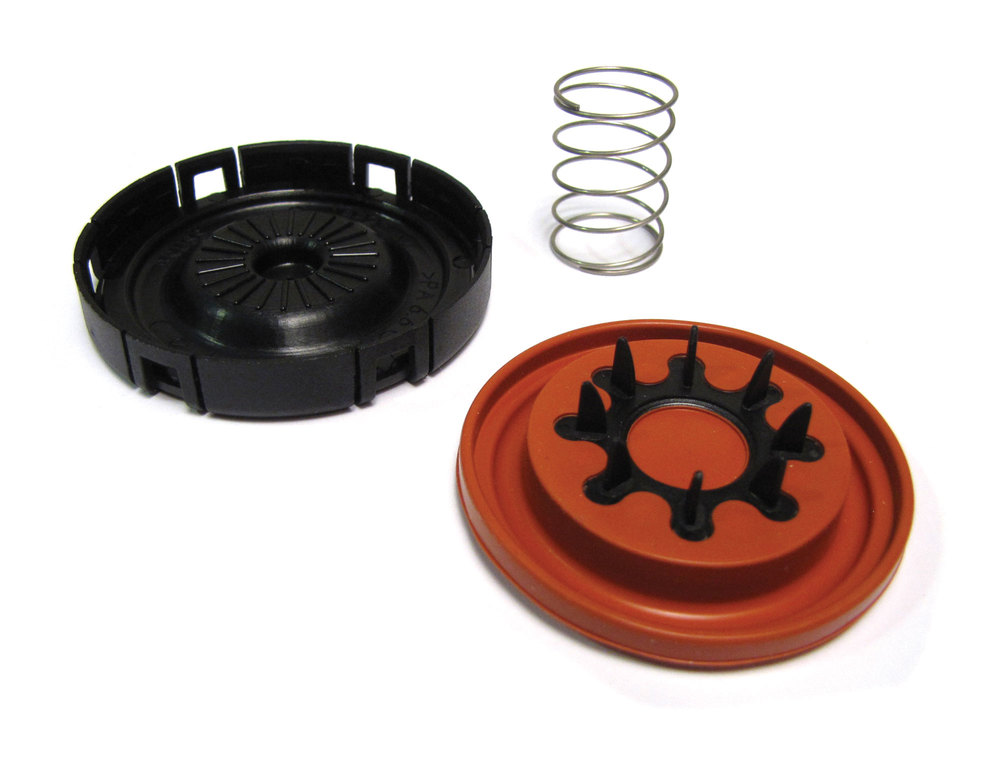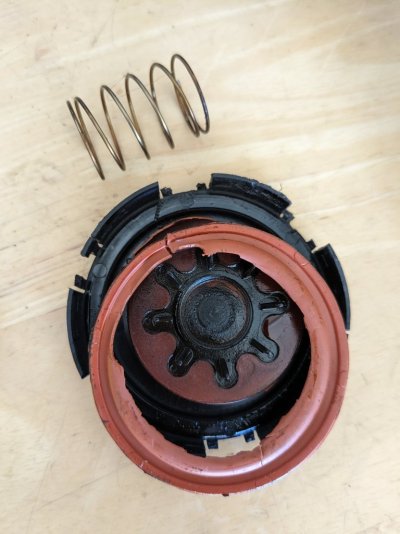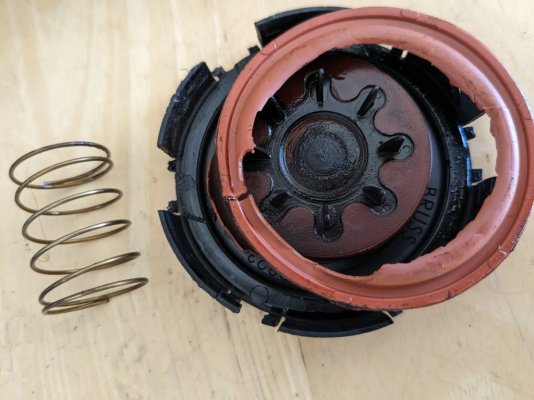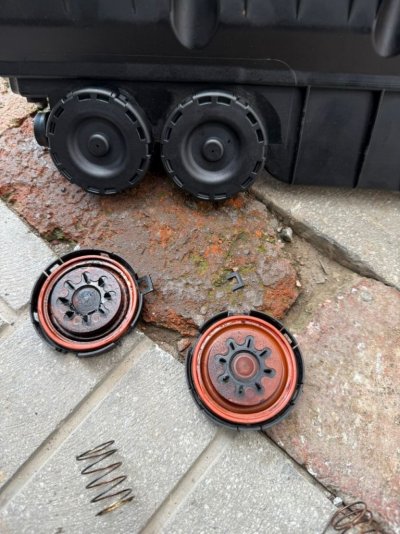You are using an out of date browser. It may not display this or other websites correctly.
You should upgrade or use an alternative browser.
You should upgrade or use an alternative browser.
PCV refresh/replacement
- Thread starter Michael Gain
- Start date
Disclaimer: Links on this page pointing to Amazon, eBay and other sites may include affiliate code. If you click them and make a purchase, we may earn a small commission.
jlglr4
Full Access Member
This PCV refresh is a good place to start if you haven’t already done it. It is probably the most common cause for the lean code at idle that I’ve seen on these forums. It’ll need to be done at some point anyway, so even if that’s not your problem, it’s not a waste of time.
You can probably narrow it down to a vacuum leak if you have a gap tool (or other tool) that can look at fuel trims - lean fuel trims trending down to normal with increasing RPMs.
Couple of other common vacuum leaks I’ve read about have been breather hoses popping loose - especially the drivers side where it connects to the air intake plenum - that happened to me; bad purge valve; valve cover leak (you‘d be seeing an oil leak too I suspect); and other evap components (though I’d expect EVAP leak codes as well). The V8 had issues with the vacuum pump, but I haven’t heard of those on the V6 so much.
You can probably narrow it down to a vacuum leak if you have a gap tool (or other tool) that can look at fuel trims - lean fuel trims trending down to normal with increasing RPMs.
Couple of other common vacuum leaks I’ve read about have been breather hoses popping loose - especially the drivers side where it connects to the air intake plenum - that happened to me; bad purge valve; valve cover leak (you‘d be seeing an oil leak too I suspect); and other evap components (though I’d expect EVAP leak codes as well). The V8 had issues with the vacuum pump, but I haven’t heard of those on the V6 so much.
Land Rover Joe
Full Access Member
Great Posts and photographs everyone!
Thank you @Michael Gain!
I purchased two "PCV Valve Service Kit LR133579, Includes Diaphragm And Cap" from Atlantic British and did the install today.
There were no codes and no visible or auditory issues but felt that after 15 years and 90,000 miles - it would be time for a PCV Valve refresh. Also, this job is WAY easier with the engine broken down.
My truck is a 2010 LR4 (5.0 V8) with 90,000 miles.
There were no obvious issues with the old PCV Valves but I am glad that we replaced them and would recommend anyone who pulls the valve covers off to go ahead and just do this job with all the parts more easily accessible (as @jlglr4 notes). The springs are a bit corroded, the metal covers did break (the little retainers, as expected), and the plastic/rubber seal is pretty worn and dirty and getting brittle. But they had not failed (yet).
Thanks again and below is a photo of what the new valves look like on the covers before re-installation, in front of the old valves.
I Appreciate folks insights!
Thank you @Michael Gain!
I purchased two "PCV Valve Service Kit LR133579, Includes Diaphragm And Cap" from Atlantic British and did the install today.
There were no codes and no visible or auditory issues but felt that after 15 years and 90,000 miles - it would be time for a PCV Valve refresh. Also, this job is WAY easier with the engine broken down.
My truck is a 2010 LR4 (5.0 V8) with 90,000 miles.
There were no obvious issues with the old PCV Valves but I am glad that we replaced them and would recommend anyone who pulls the valve covers off to go ahead and just do this job with all the parts more easily accessible (as @jlglr4 notes). The springs are a bit corroded, the metal covers did break (the little retainers, as expected), and the plastic/rubber seal is pretty worn and dirty and getting brittle. But they had not failed (yet).
Thanks again and below is a photo of what the new valves look like on the covers before re-installation, in front of the old valves.
I Appreciate folks insights!
Attachments
Land Rover Joe
Full Access Member
Tribe,
An update to everyone regarding my engine rebuild and PVC services.
So I ordered two new valves from Atlantic British: PCV Valve Service Kit, LR133579, which included rubber diaphragm, plastic cap, and steel spring. See -

After the initial checks, the engine started making some strange noises (high pitched, almost whistling). These noises corresponded to engine RPMs (more RPM's, higher pitch and greater volume) and seemed like some sort of weird engine vacuum issue: when you opened the oil filler cap, there was a lot of suction.
There was no visible smoke (oil burning) or additional condensation in the exhaust. The engine ran a little bit rougher but not problematic (it was completely drive-able).
After some listening and looking around for a week, we traced the noise to the new PCV valves. We opened those up again and despite the old PCV springs being a bit rusty (not that bad), they were soft in comparison with the new ones which were very stiff. We put the old PCV springs back in and then buttoned everything up again in order to see what would happen.
Engine then ran better than new (again).
These new, stiff, springs seemed to have been the problem but I don't know why (new, stiff) springs would be the source of this issue.
Perhaps we screwed something up? Perhaps this kit has poor or the wrong springs?
Any thoughts or insights would be most welcomed!
An update to everyone regarding my engine rebuild and PVC services.
So I ordered two new valves from Atlantic British: PCV Valve Service Kit, LR133579, which included rubber diaphragm, plastic cap, and steel spring. See -

PCV Valve Service Kit For LR4, Discovery 5, Range Rover - LR133579
Complete PCV valve service kit, including diaphragm and cap. Fits various LR4, Discovery 5 and Range Rover vehicles from 2010 and up.
www.roverparts.com
After the initial checks, the engine started making some strange noises (high pitched, almost whistling). These noises corresponded to engine RPMs (more RPM's, higher pitch and greater volume) and seemed like some sort of weird engine vacuum issue: when you opened the oil filler cap, there was a lot of suction.
There was no visible smoke (oil burning) or additional condensation in the exhaust. The engine ran a little bit rougher but not problematic (it was completely drive-able).
After some listening and looking around for a week, we traced the noise to the new PCV valves. We opened those up again and despite the old PCV springs being a bit rusty (not that bad), they were soft in comparison with the new ones which were very stiff. We put the old PCV springs back in and then buttoned everything up again in order to see what would happen.
Engine then ran better than new (again).
These new, stiff, springs seemed to have been the problem but I don't know why (new, stiff) springs would be the source of this issue.
Perhaps we screwed something up? Perhaps this kit has poor or the wrong springs?
Any thoughts or insights would be most welcomed!




